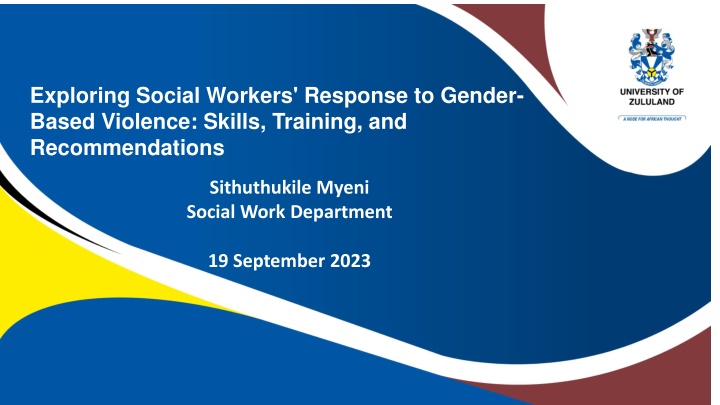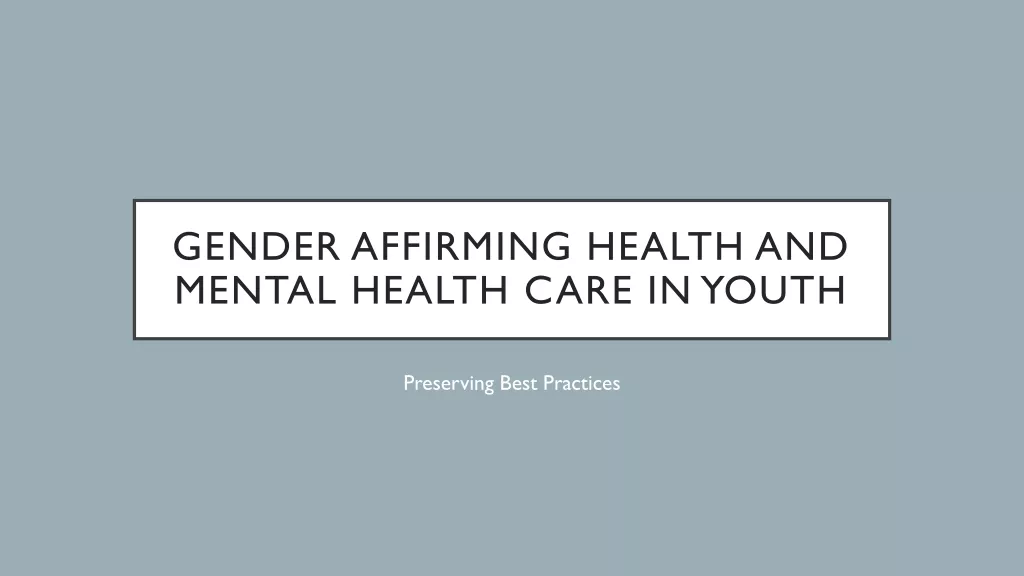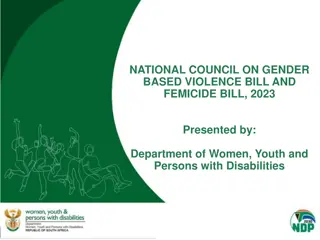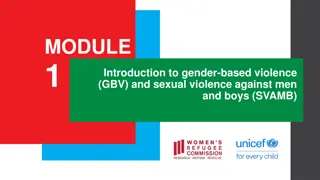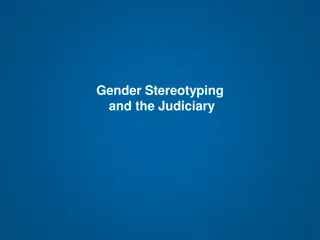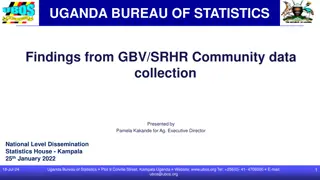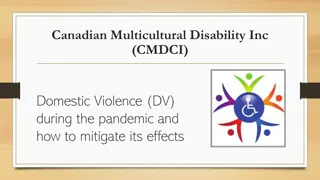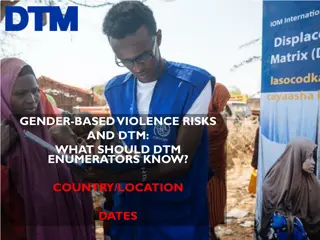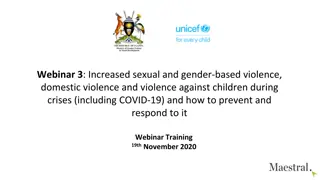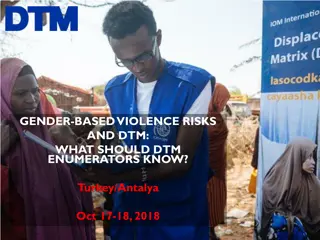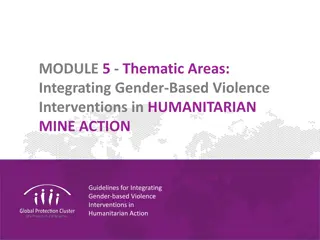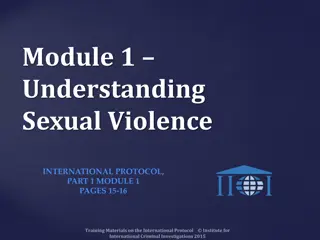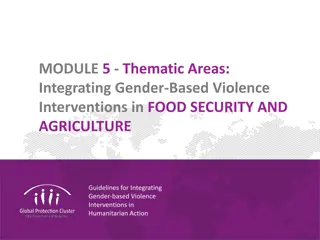Social Workers' Response to Gender-Based Violence: Skills, Training, and Recommendations
This presentation explores the response of social workers to gender-based violence, focusing on the prevalence of such violence globally and in South Africa. It discusses the study methodology, key themes from social workers' responses, and concludes with recommendations for strengthening social work interventions in the face of escalating gender-based violence incidents. The study highlights the importance of skills, values, and principles in addressing gender-based violence effectively.
Uploaded on Aug 01, 2024 | 8 Views
Download Presentation

Please find below an Image/Link to download the presentation.
The content on the website is provided AS IS for your information and personal use only. It may not be sold, licensed, or shared on other websites without obtaining consent from the author.If you encounter any issues during the download, it is possible that the publisher has removed the file from their server.
You are allowed to download the files provided on this website for personal or commercial use, subject to the condition that they are used lawfully. All files are the property of their respective owners.
The content on the website is provided AS IS for your information and personal use only. It may not be sold, licensed, or shared on other websites without obtaining consent from the author.
E N D
Presentation Transcript
Exploring Social Workers' Response to Gender- Based Violence: Skills, Training, and Recommendations Sithuthukile Myeni Social Work Department 19 September 2023
Presentation outline 1. Prevalence of gender-based violence in SA 2. Study methodology 3. Themes emanating from the social workers responses & Findings 4. Conclusions 5. Recommendations
Prevalence of gender-based violence Globally- one in three women, or over 800 million women, worldwide experience physical and/or sexual violence by an intimate partner, or sexual violence by a perpetrator Gender-based violence is a complex crisis with devastating consequences, demanding comprehensive and proactive responses from social workers. In South Africa, the escalating incidents of gender-based violence underscore the need for strengthened social work interventions. GBV is a global epidemic affecting women from all walks of life. In the first three months of 2023, 10512 women were raped, 1485 attempted murders of women were reported, 969 women were killed, and over 15,000 women were assaulted Various forms of GBV: physical abuse; sexual abuse; emotional, verbal, and psychological abuse; economic coercion; intimidation; harassment, and stalking. GBV most predominant human rights violations in the world affecting mainly women and girls.
Study methodology QUALITATIVE STUDY PHENOMENOLOGICAL RESEARCH DESIGN A PURPOSIVE SAMPLE OF 26 SOCIAL WORKERS GOVERNMENT AND NGO SETTING, 3 OR MORE YEARS EMPLOYMENT IN GBV SECTOR. DATA COLLECTION: SEMI STRUCTURED INTERVIEWS, FOCUS GROUP DISCUSSIONS, DOCUMENTS ANALYSIS (POLICY AND LEGISLATION GBV SPECIFIC) THEMATIC CONTENT ANALYSIS INCORPORATED WITH NVIVO
Themes emanating from the social workers responses Skills, values, and principles in action Capacity development and training Insufficient training Policies and legislation
Themes emanating from the social workers responses 1. Skills, values, and principles in action The study found that social work expertise and skills are essential for providing holistic and informed services to victims of gender-based violence. Key skills include networking and collaborative interventions, listening, communication, partializing, and probing. Social workers also need to apply social work values, principles, and ethics to their practice. Communications skills are very important. Uh listening skills are important. Networking is very important. Networking skills with stakeholders, to know who they would be in contact with when they go to the shelter. . (FGD Participant 4) To get the gist of the problem you should be able to probe well by using commutation skills. Understanding diversity also helps. (FGD Participant 12)
Skills, values, and principles in action continues.. The study participants highlighted the importance of active listening in understanding the client's story and building trust. They also noted that communication skills are essential for assessing the type of stakeholder to involve in the interventions, thereby ensuring a holistic approach. Other social work skills that were identified as important include: Observation skills (FGD Participant 7, FGD Participant 1) Imparting coping skills to clients (FGD Participant 15) The skill of immediacy. The situation of the client is an emergency, and it requires you to act immediately . (INT Participant 21, FGD participant 5) Advocacy skills . (FGD Participant 10) The study participants agreed that social work skills help them to better assist victims of gender-based violence, but they also noted that the skills alone are not enough. Social workers also need to have sufficient information about trauma in order to protect themselves from indirect trauma.
Themes emanating from the social workers responses 2. Capacity development and training The findings underscore the need for continuous training and development for social workers, particularly in the context of trauma and gender-based violence, to ensure effective support for clients and to keep up with evolving practices and policies. It also highlights some challenges and areas for improvement in the training processes for social workers. Social workers helping trauma victims have a responsibility to enhance their knowledge and skills to assist trauma patients effectively. Capacity development and training help social workers stay updated on policies and social work practice guidelines. Many participants recognize the significance of obtaining a Bachelor of Social Work degree and the role of their undergraduate training in preparing them for social work, albeit not fully for gender- based violence cases. Continued training is necessary because theory alone may not suffice when dealing with real-world practice, as acknowledged by participants.
Capacity development and training Specialized training is needed for social workers dealing with gender-based violence cases, as it demands specific knowledge, abilities, and ethics. The majority of participants have received some training, such as trauma management, grief management, and crisis intervention workshops, to address trauma cases and emotional situations. Continuous Professional Development (CPD) is important for social workers to keep up with evidence-based strategies and efficient service delivery. The need for ongoing trauma-based workshops and training is highlighted to improve support techniques and build self-confidence among practitioners. Some social workers have attended workshops on laws and policies relevant to gender-based violence, but refresher sessions are lacking. Concerns are raised about the effectiveness of the "train-the-trainer" model, as participants prefer training from external service providers rather than colleagues within their office.
Capacity development and training Differences in understanding and communication when colleagues conduct training sessions internally are identified as potential issues. Participants from the Department of Social Development (DSD) report having attended gender- based violence training, while many from non-governmental organizations (NGOs) have not received specific training in this area. Generic social work services are more common in training, and gender-based violence services are not always considered a specialized field.
Policies and legislations identified by the study participants Social work intervention is guided by policy and legislation. This is to ensure that the implementation of services is conducted in a professional manner to promote the rights of all people. More than half of the participants were able to identify policies that informed their intervention processes with victims of gender-based violence. The influence of policies and legislation on social work interventions is highlighted, emphasizing the need for their effective implementation to combat gender-based violence effectively. South Africa has ratified the various international policies aimed at fighting the epidemic of gender- based violence.
Policies and legislation identified by the study participants Identifier INT Participant 3 INT Participant 2, 22, 17, 20, 12, 14 Policy/legislation Norms and standards of shelters. CW Forms (the procedure manual for the revised generic intervention processes tools: casework, group work & community work). FGD Participant 12 FGD Participant 8 Children s Act no 38 of 2005, as amended. The sexual offences Act amended number 32 or number 37. That one provides rights of the sexually assaulted victims. FGD Participant 18 Strategic framework, I once attended a seminar on strategic framework on gender-based violence and femicide. They explained that it is multi-sectoral and therefore works with other stakeholders to respond as a collective concerning gender-based violence. I think it is the Domestic Violence Act. You also must quote to them [victims] their rights, the victim s rights using the Victims Rights Charter. We also must include substance abuse act (Prevention of and Treatment for Substance Abuse Act, 2008) because there could be substance abuse in some of these cases. We also have the Trafficking in Persons Act. Sometimes we do see that it is GBV, but it also has some aspects of [TIP]. We are guided by children s Act." FGD Participant 17 INT Participant 21 FGD Participant 11 INT Participant 22
Conclusion and call to action The provided information underscores the importance of applying social work values, principles, and ethics when working with victims of gender-based violence. Social workers utilize various skills, including communication, probing, partializing, and active listening, to understand client issues. However, the findings indicate that having skills alone may not be sufficient, as social workers may lack a deep understanding of trauma and its potential impact on both clients and themselves. This highlights the need for trauma-informed workshops and capacity development for social workers in this field. Additionally, there is a strong emphasis on the importance of training and workshops to help social workers apply policy and legislation effectively in gender-based violence interventions.
Recommendations for future training, skills and improving social work practice in the GBV arena Social workers play a critical role in addressing gender- based violence, leveraging their skills and expertise to assess and meet the unique needs of survivors. They provide counseling, therapy, case management, advocacy, education, and engage in policy advocacy. Collaboration and networking are key to connecting victims with relevant services. Several authors emphasize the importance of social work skills, integrated networks, and raising awareness to combat gender-based violence globally. Trauma-informed care is essential, and continuous training is required to support social workers in managing the emotional toll of their work.
